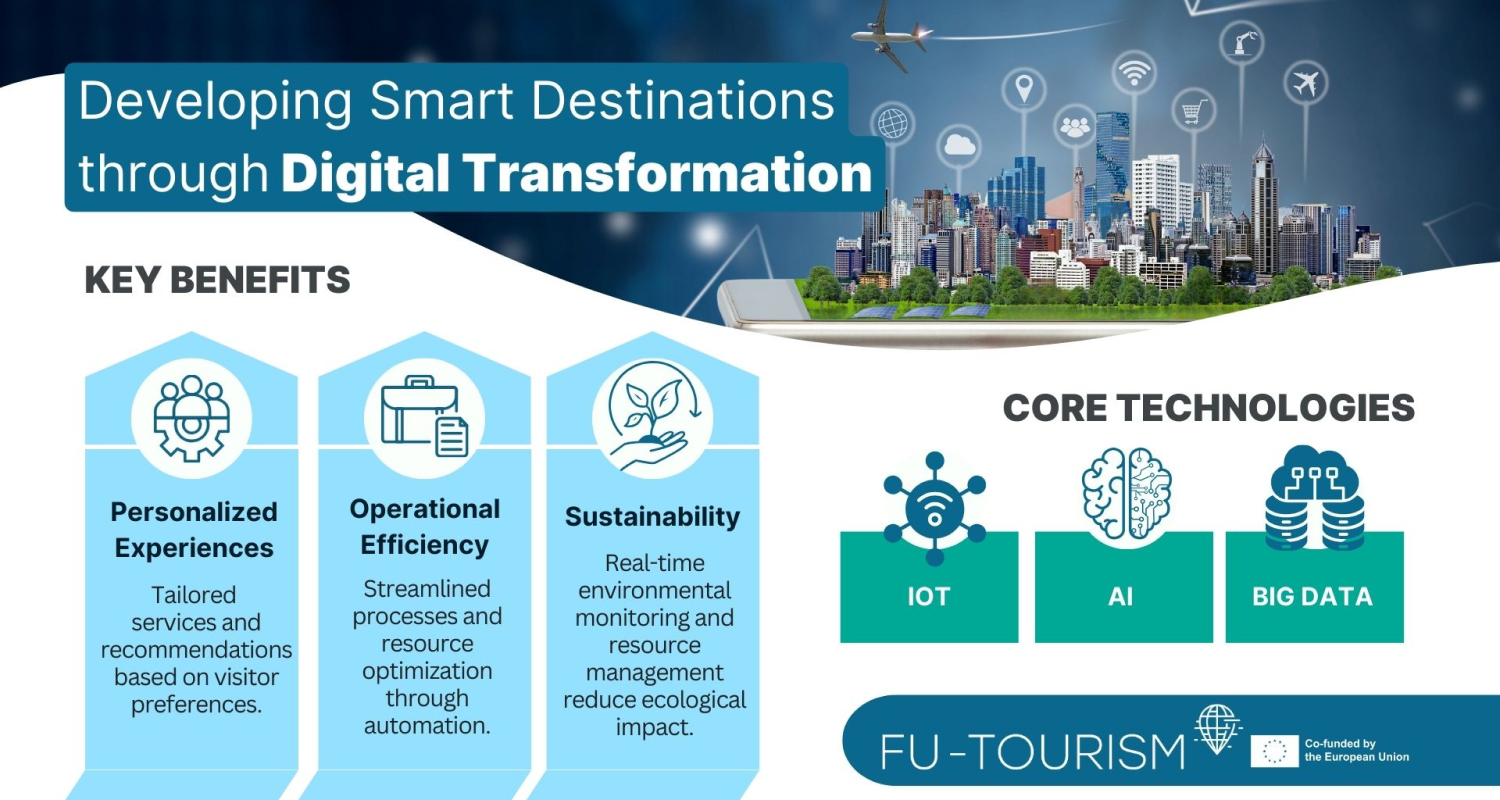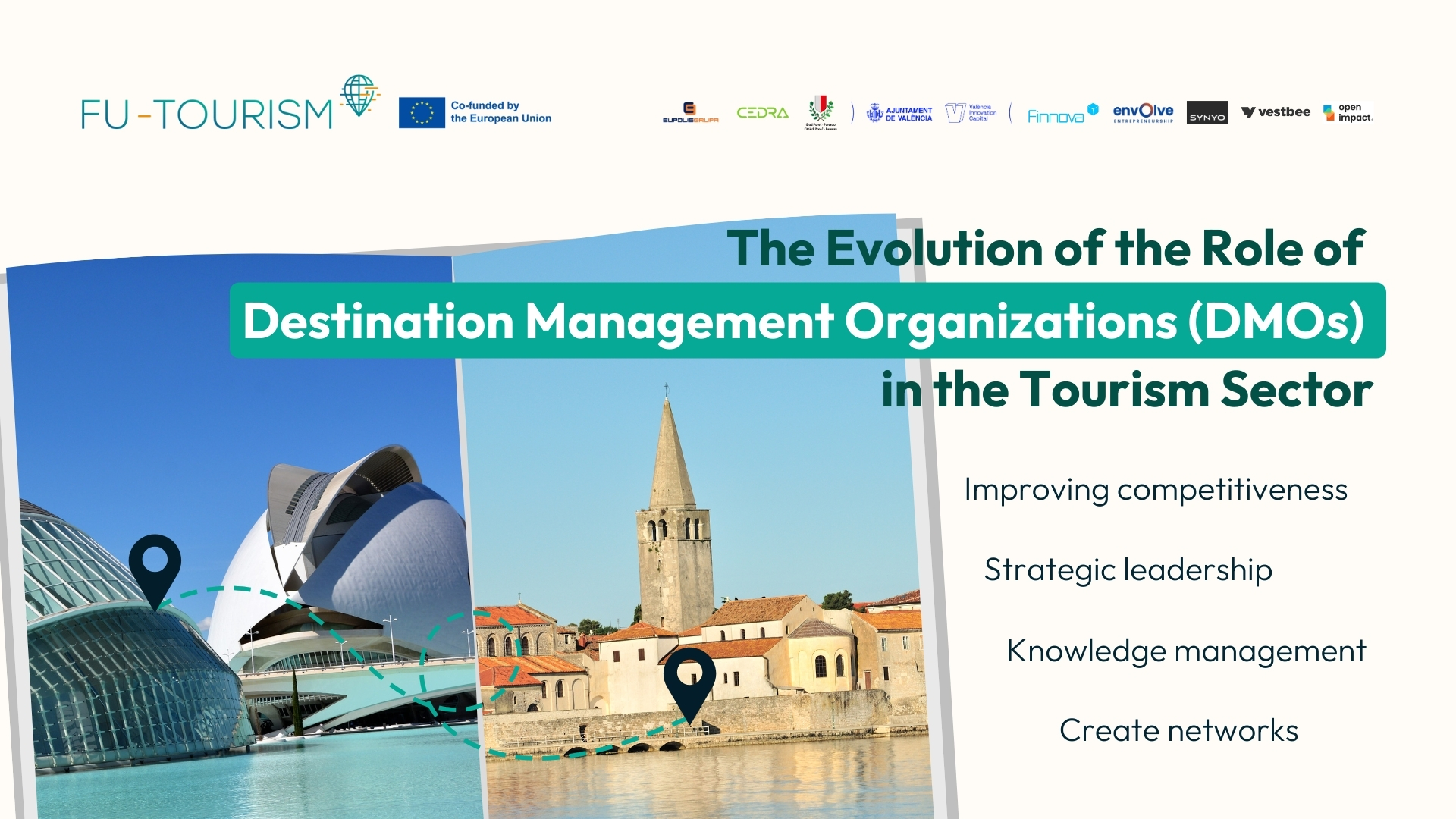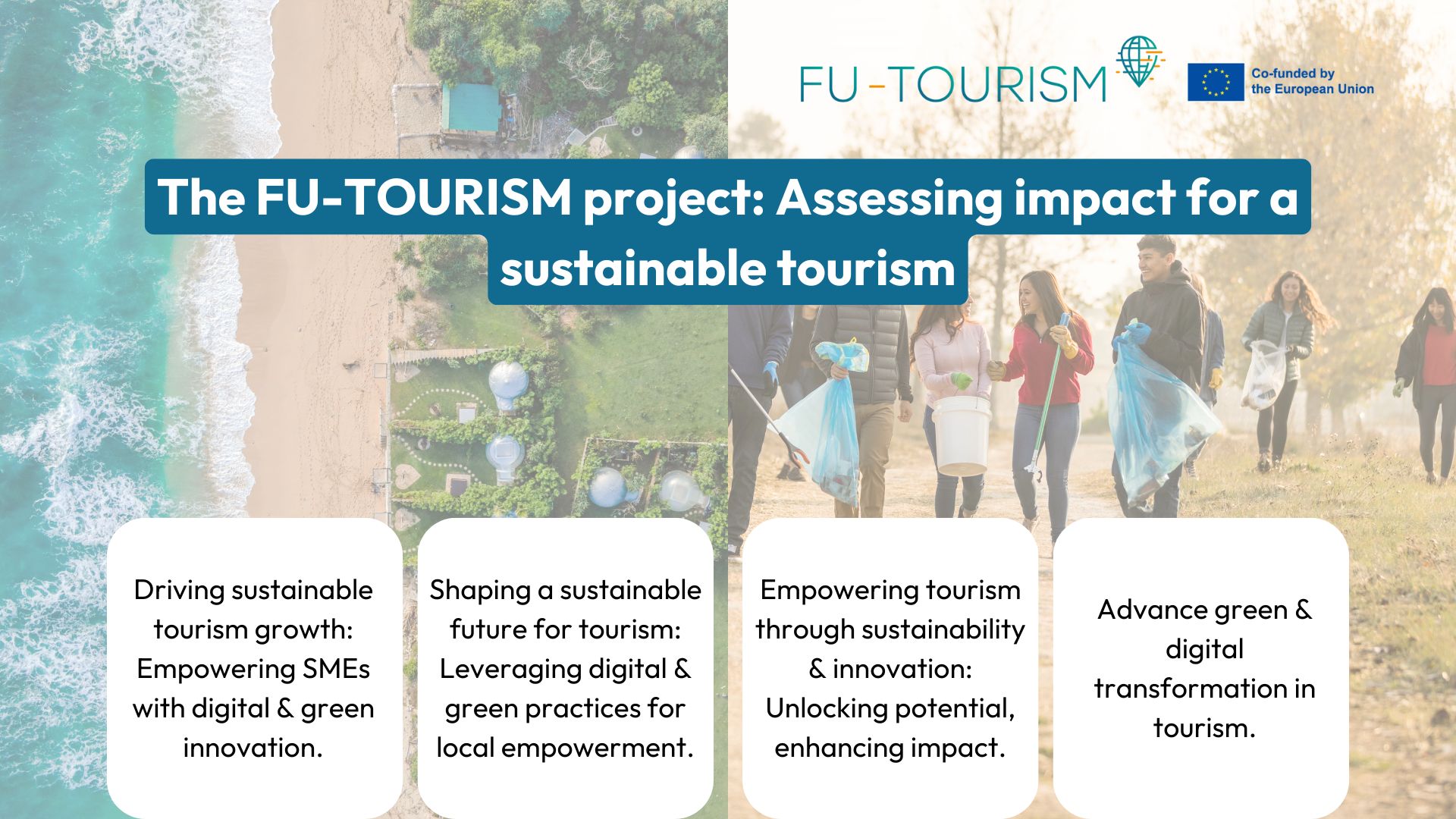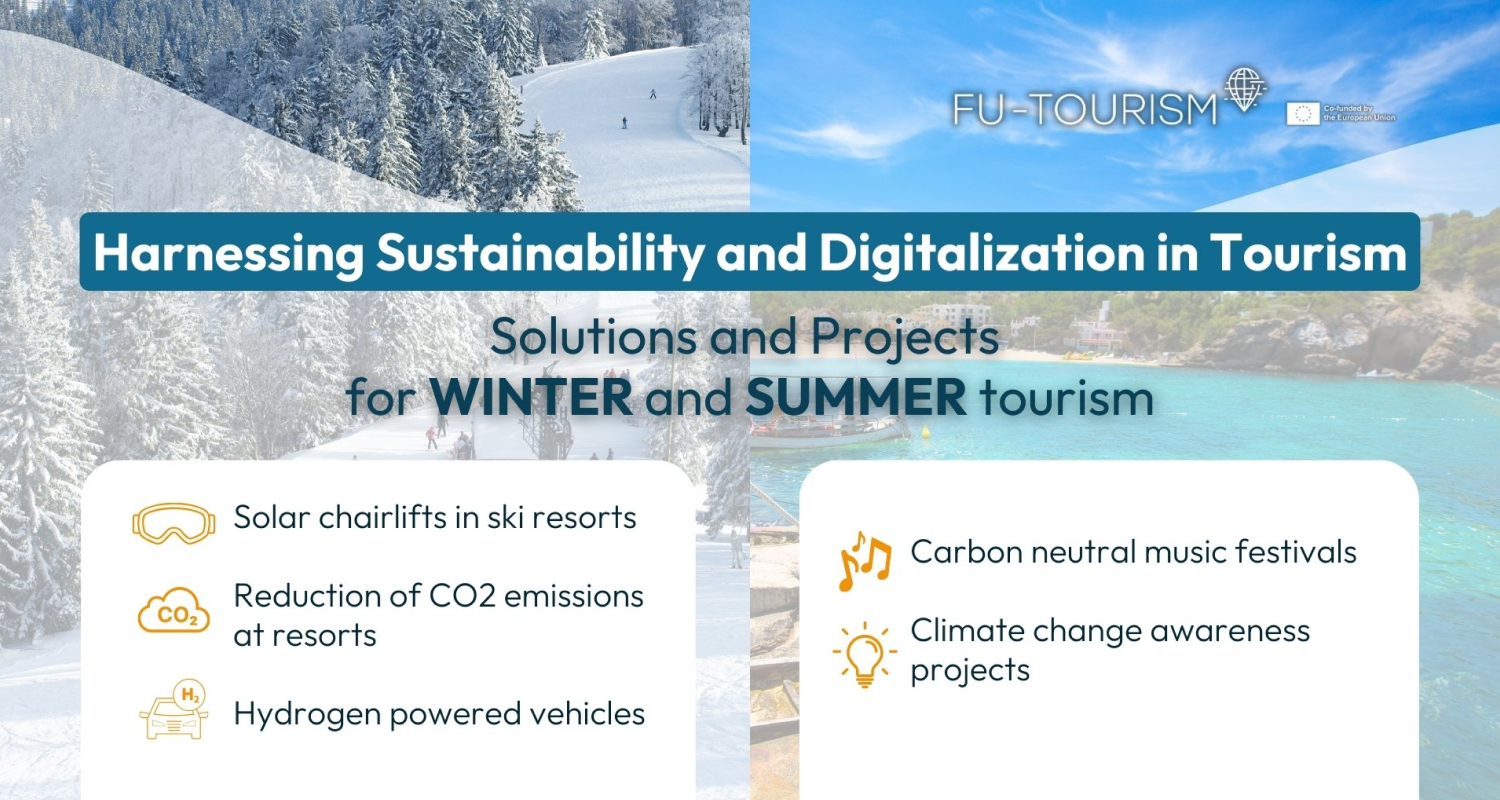
Developing Smart Destinations through Digital Transformation
What Are Smart Destinations and How Do They Develop?
In today’s digital age, the concept of smart destinations has become crucial for success in the tourism sector. But what does it really mean to be a smart destination?
At the core of this concept lies the integration of advanced technologies to enhance visitor experiences and optimize operations. Smart destinations use technologies such as the Internet of Things (IoT), artificial intelligence (AI), and Big Data to create dynamic, interactive, and sustainable tourist destinations.
Digital transformation is one of the main focuses of the FU-TOURISM project, with two destinations (town of Porec-Parenzo in Croatia and city of Valencia in Spain) who are striving to become ones themselves.
Traditional tourist destinations often rely on basic infrastructure services and standard marketing strategies. However, smart destinations go beyond these approaches by applying innovative technologies that enable personalized and interactive services.
Implementation of IoT, AI, and Big Data in Tourism: Smart Cities and Smart Hotels
Iot (Internet of Things) is the key aspect of developing smart destinations to create connected ecosystems. IoT refers to a collective network of devices and cloud and technology that enables communication between them.
Smart cities (cities who are technologically advanced) use IoT sensors to monitor and manage various urban functions, from traffic and parking to energy management and security. For instance, sensors can help reduce traffic congestion by providing data on current conditions and suggesting alternative routes to drivers.
Smart hotels (hotels which are equipped with advanced technology), on the other hand, use IoT to enhance guest experiences. Imagine a hotel where guests can adjust lighting and temperature, and even order services via mobile apps or voice assistants, improving comfort, enabling hotels to optimize operations, reduce energy consumption, and provide personalized services tailored to individual guest needs.
Artificial intelligence (AI) comes to the scene as an increasingly important factor in the development of smart destinations. AI systems can analyze large amounts of data in real-time to create predictive models and recommendations that enhance user experiences. For example, AI can analyze data on previous visits and preferences to recommend activities, restaurants, or attractions that visitors are likely to enjoy.
One intriguing example of AI in tourism is the use of chatbots for customer support in smart cities. These chatbots can answer visitor questions, provide information about local events, and even assist with real-time reservations, so it not only improves access to information but also reduces the burden on human staff, allowing them to focus on more complex tasks.
The application of Big Data (high volume, high velocity data sets) analytics has been established as a top priority in the context of developing smart destinations for some time. Analytics enables the collection and processing of data on visitor behavior, including movement patterns, time spent at specific locations, and demographic data. This data can be used to optimize services and operations and to develop targeted marketing campaigns that increase engagement and visitor satisfaction.
For instance, big data analytics can help predict when certain attractions will be busiest, allowing destinations to adjust their resources and staff accordingly. This results in a smoother experience for visitors and more efficient operations for destination managers.
Developing Smart Destinations: Innovations in Practice
As technology evolves, smart destinations will continue to develop, offering even more sophisticated and customized services. The future of tourism will be shaped by innovations that enable a better understanding of visitor needs and the creation of experiences that are not only exciting but also meaningful and personal.
Smart destinations are not just a concept; they are a rapidly developing reality aligned with the latest technological advancements. When discussing the application of these technologies in practice, it is important to consider concrete examples and strategies that have demonstrated success.
Consider the example of the smart city of Venice, which has implemented a wide network of IoT sensors to improve urban management and visitor experiences. Sensors for monitoring air quality and noise levels allow city authorities to manage environmental conditions in real-time, while smart traffic management systems optimize vehicle flow and reduce congestion. These systems not only improve the quality of life for residents but also increase the city’s attractiveness to tourists seeking a pleasant and sustainable environment.
Similarly, the city of Helsinki uses advanced analytics tools to collect data on visitor movement and spending, enabling better customization of marketing campaigns and services. This data helps optimize tourist routes and identify key attractions that draw the most visitors.
In the hotel industry, smart technologies are revolutionizing the way hotels communicate with their guests. For example, the luxury hotel “YOTEL” in New York* uses technology for automatic check-in and check-out via kiosks and mobile apps, significantly reducing wait times and enhancing guest experiences. Additionally, hotels like “Hotel EMC2” in Chicago** use robots Cleo and Leo to help serve guests.
Smart hotels also use AI chatbots for real-time guest support. These chatbots can answer common questions, assist with reservations, and provide information about local attractions, reducing the need for human staff and improving efficiency.
The synergy between various digital tools and technologies is key to the development of smart destinations. For example, combining IoT sensors with Big Data analytics allows destinations not only to monitor current conditions but also to predict future trends and visitor behavior. By using data to tailor offerings and operations, destinations can create personalized experiences that align with visitor needs and preferences.
Challenges and Perspectives: Technical and Organizational Aspects
However, success in implementing smart solutions does not come without challenges. Technical adaptation and integration of various systems can be complex and costly. Additionally, data security and privacy are major concerns that need to be addressed as the amount of collected data grows. Destinations must establish clear data protection guidelines and ensure that all systems are safeguarded against potential threats. ensure all systems comply with the latest security standards.
Besides technical challenges, operational adaptation also plays a crucial role. Training staff to work with new technologies and implementing effective change management strategies are key to success. Destinations need to invest in continuous training and development to ensure that their staff is prepared to work with advanced systems. Technical integration of various technologies, the implementation of advanced analytical tools also requires significant adaptation of existing systems.
Collaboration with technology partners and service providers can significantly help in overcoming challenges and accelerating the implementation process. Partnerships with tech companies that offer smart destination solutions can provide access to the latest innovations and expertise needed for successful technology adoption and collaborating with companies specializing in Big Data analytics can help destinations better understand visitor behavior and adjust their strategies accordingly. Also, it is very important to regularly evaluate strategies based on feedback and new technological advancements.
As technology advances, trends in the development of smart destinations will continue to evolve. New directions include the integration of advanced technologies such as 5G networks and virtual reality (VR), which will further enhance visitor experiences and enable new levels of interaction with destinations. For example, virtual tours via VR can allow visitors to explore destinations and attractions before deciding to travel, significantly increasing engagement and destination appeal.
Conclusion: Transforming Tourism Through Smart Technologies
Development of smart destinations represents a significant step towards creating sustainable and customized tourist experiences, requiring synergy between various technological solutions, strategic thinking, and innovative approaches.
One of the key factors in the success of smart destinations lies in their ability to integrate technologies sustainably. For example, using IoT sensors to monitor air quality and manage traffic not only enhances visitor experiences but also contributes to reducing the ecological footprint, and finally allows cities and destinations to optimize resources and reduce negative environmental impacts, which is essential in today’s increasingly sustainability-focused world.
Given the complexity of implementing smart solutions, destinations face numerous challenges. and additional staff training.
Looking to the future, trends in the development of smart destinations will continue to evolve, enabling destinations to better tailor their services to visitor needs and offer innovative ways to explore and experience destinations.
Smart destinations are revolutionizing tourism, placing technology at the heart of the tourist experience. By integrating smart technologies and strategies, destinations can create customized and sustainable experiences that meet and exceed visitor expectations. As technology advances, the possibilities for innovation and enhancing tourist experiences will continue to expand, providing numerous opportunities for growth and development in the tourism industry.
Ultimately, success in developing smart destinations depends on the ability to use technology to enhance visitor experiences, promote sustainability, and create long-lasting value.
FU-TOURISM project aims to support small and medium enterprises to develop digital solutions for tourism. During Acceleration and Scale up programs selected SMEs will get funding and comprehensive training programs to equip them with knowledge on diverse technologies.
To learn more about FU-TOURISM, subscribe to our newsletter.
References:
*https://intelity.com/news/2021/yotel-takes-next-step-with-intelity/
**https://www.10news.com/robots-deliver-room-service-hotel-chicago/




